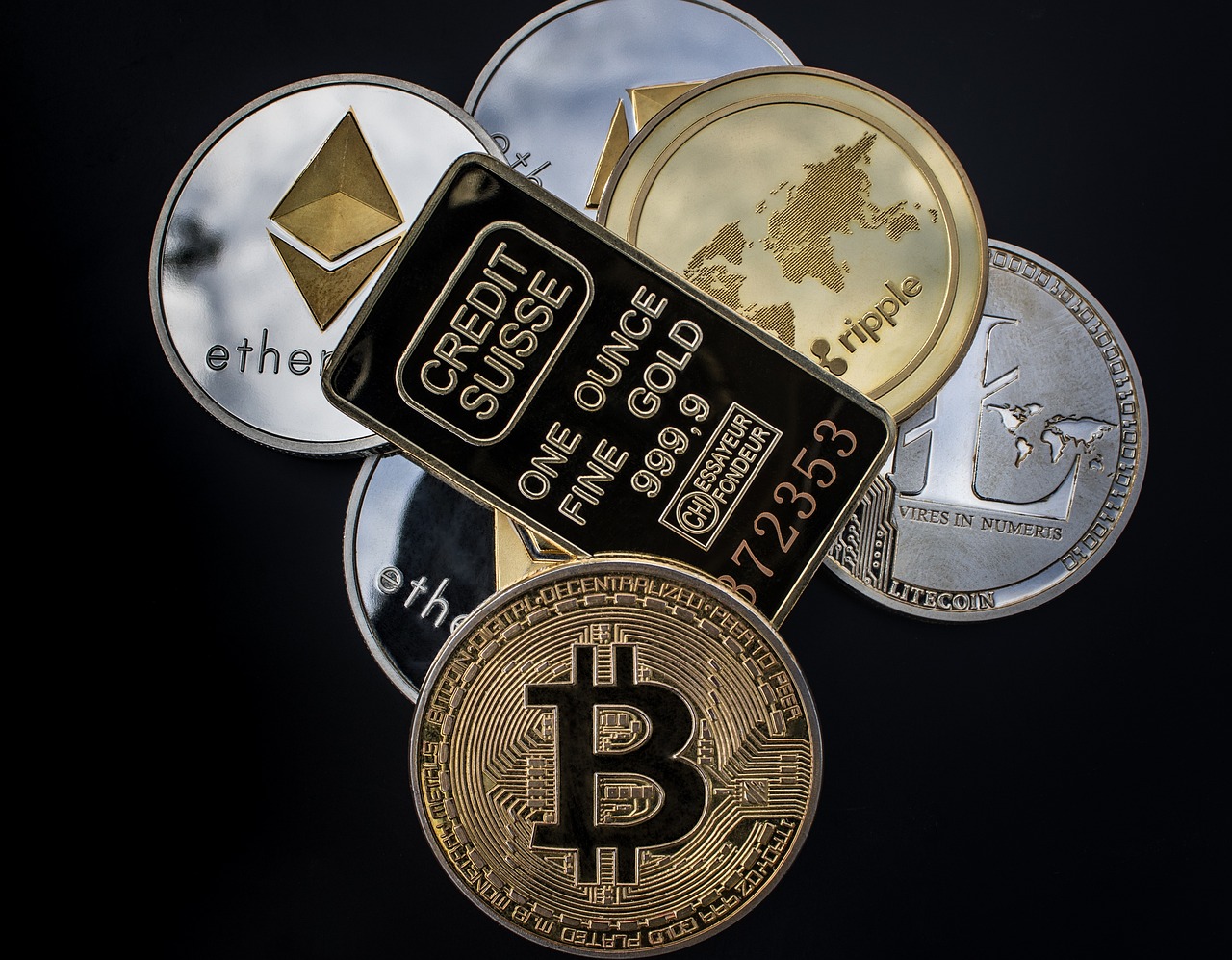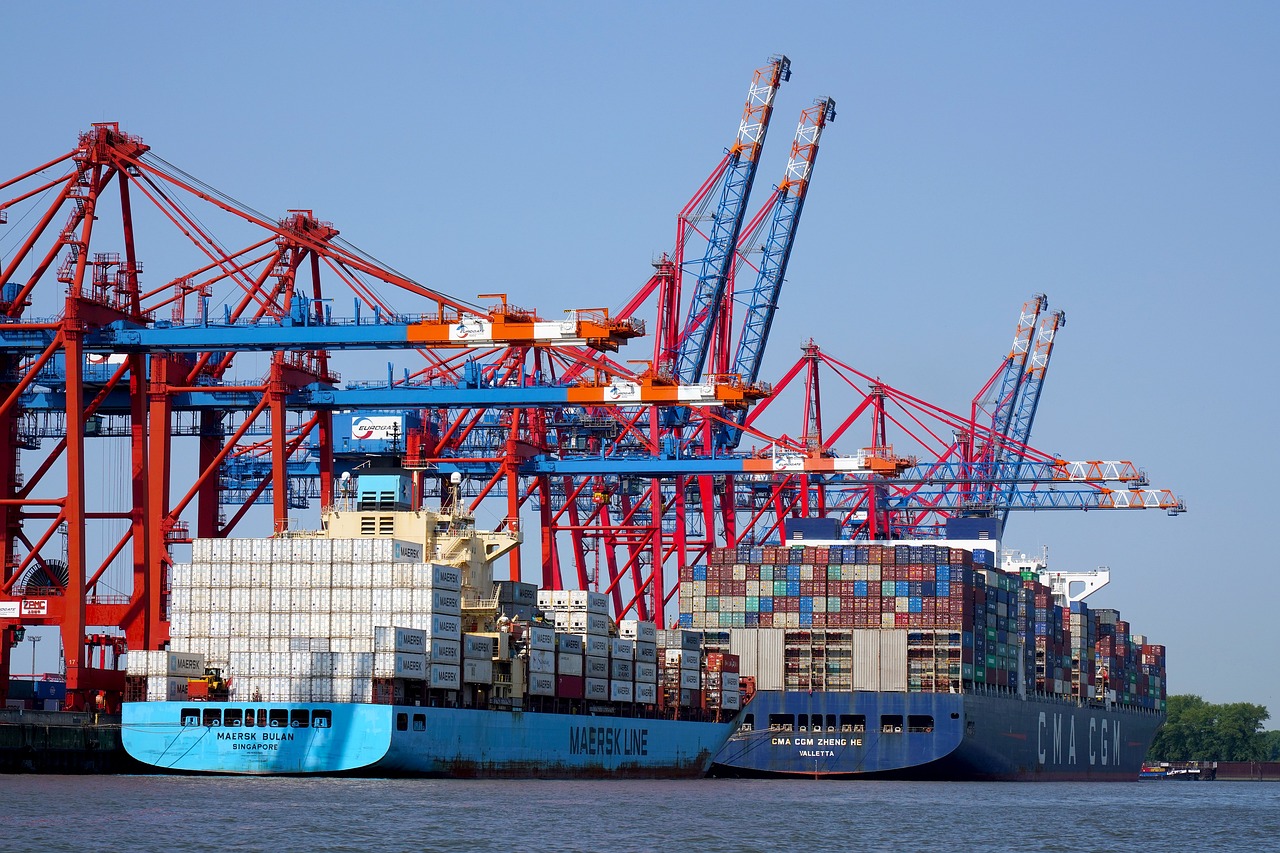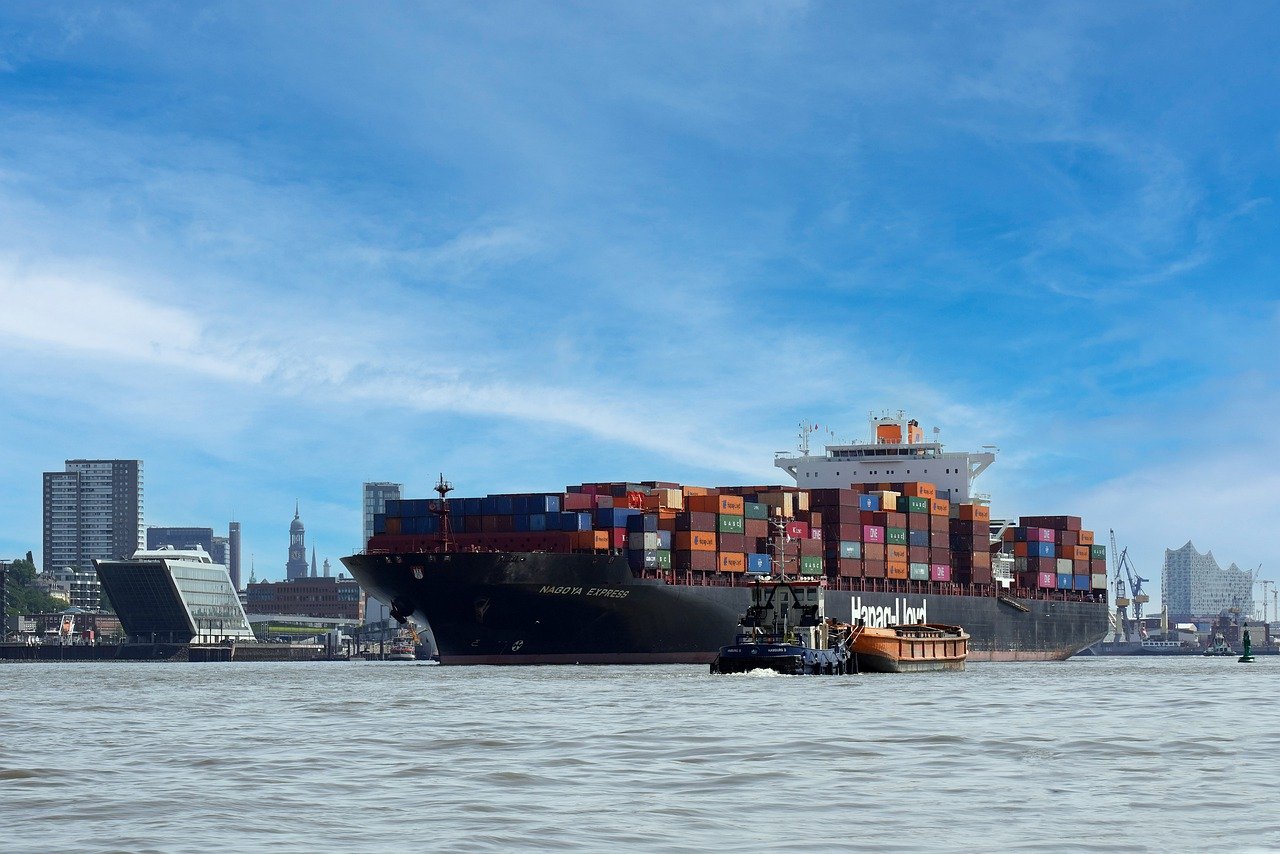The Role of Blockchain in Managing Supply Chain Disruptions
In today's fast-paced and ever-evolving global market, supply chain disruptions can feel like a storm brewing on the horizon—unexpected and potentially catastrophic. Enter blockchain technology, a game-changer that promises to bring stability, transparency, and resilience to supply chains across various industries. Imagine a world where every transaction is securely recorded, every product is traceable, and every stakeholder is held accountable. That’s the reality blockchain brings to the table, transforming the way companies manage their supply chains and tackle disruptions head-on.
Blockchain operates as a decentralized digital ledger, meaning that no single entity has control over the entire system. This decentralization fosters a level of transparency that is revolutionary in supply chain management. With blockchain, every participant in the supply chain—be it manufacturers, suppliers, distributors, or retailers—can access the same information in real-time. This shared visibility not only enhances trust among partners but also allows for quicker decision-making when disruptions occur. Think of it as a collaborative map that everyone can see and contribute to, ensuring that no one is left in the dark.
As we delve deeper into this topic, it becomes apparent that the benefits of blockchain extend far beyond mere transparency. They include enhanced traceability, reduced fraud, and improved collaboration among supply chain partners. Each of these aspects plays a crucial role in mitigating the impact of disruptions, whether they stem from natural disasters, geopolitical tensions, or logistical challenges. For instance, when a shipment is delayed, blockchain allows stakeholders to pinpoint the exact location and status of the goods, enabling them to respond swiftly and effectively. This level of real-time monitoring can be likened to having a GPS tracker for your supply chain, guiding you through the uncertainties and helping you navigate obstacles with ease.
Yet, while the advantages of blockchain are compelling, it's essential to recognize that implementing this technology is not without its challenges. Issues such as scalability, interoperability, and regulatory concerns can pose significant hurdles for organizations looking to adopt blockchain solutions. It's akin to trying to fit a square peg into a round hole—without the right tools and strategies, the integration can be cumbersome and frustrating. However, with ongoing advancements in technology and a growing understanding of best practices, many companies are finding ways to overcome these obstacles and harness the full potential of blockchain.
In the following sections, we will explore the myriad benefits of blockchain in supply chains, delve into the challenges that come with its implementation, and showcase real-world applications that highlight its transformative power. By the end of this article, you will not only grasp the significance of blockchain in managing supply chain disruptions but also appreciate its role as an indispensable ally in the quest for resilience and efficiency.
- What is blockchain technology? Blockchain is a decentralized digital ledger that records transactions across many computers, ensuring security and transparency.
- How does blockchain enhance supply chain management? It improves traceability, accountability, and reduces fraud by providing a transparent record of transactions.
- What are the main challenges of implementing blockchain? Key challenges include scalability, interoperability, and navigating regulatory frameworks.
- Can blockchain prevent supply chain disruptions? While it can't eliminate disruptions, it significantly improves response times and accountability, minimizing their impact.

Understanding Blockchain Technology
Blockchain technology has been making waves in various industries, and for good reason. At its core, blockchain is a decentralized digital ledger that records transactions across multiple computers. This means that once a transaction is added to the chain, it cannot be altered or deleted, ensuring a level of security and transparency that is hard to achieve with traditional systems. Imagine a notebook that everyone can see and write in, but no one can erase or modify what's already been written. This is the essence of blockchain.
The fundamental principles of blockchain revolve around three key concepts: decentralization, immutability, and transparency. Decentralization means that no single entity has control over the entire chain, which reduces the risk of fraud and manipulation. Immutability ensures that once data is entered, it remains unchanged, providing a reliable history of transactions. Lastly, transparency allows all participants to view the same data, fostering trust among stakeholders.
In the context of supply chain management, these principles are particularly beneficial. For instance, consider a scenario where a product is shipped from a manufacturer to a retailer. With blockchain, every step of this journey—from production to delivery—can be tracked in real-time. This not only enhances visibility but also allows for quicker identification of any issues that may arise along the way. If a product is delayed or goes missing, stakeholders can pinpoint exactly where the problem occurred, leading to faster resolutions.
To illustrate how blockchain functions within supply chains, let's take a look at a simplified representation of a blockchain transaction:
| Step | Action | Timestamp |
|---|---|---|
| 1 | Product manufactured | 2023-10-01 10:00:00 |
| 2 | Product shipped | 2023-10-02 08:00:00 |
| 3 | Product received at warehouse | 2023-10-03 12:00:00 |
| 4 | Product delivered to retailer | 2023-10-04 14:00:00 |
Each of these steps would be recorded on the blockchain, creating a permanent record that can be accessed by all relevant parties. This level of detail not only helps in tracking the product but also builds trust among all participants in the supply chain. After all, who wouldn’t want to know exactly where their product has been and when it arrived?
As we dive deeper into the world of blockchain, it becomes clear that this technology is not just a passing trend. It represents a fundamental shift in how we think about data management and security. Companies that embrace blockchain can not only enhance their operational efficiency but also gain a competitive edge in the market. The question is, are businesses ready to take the plunge and fully integrate this innovative technology into their supply chain processes?

Benefits of Blockchain in Supply Chains
In today's fast-paced world, the significance of a robust supply chain cannot be understated. With the increasing complexity of global trade, companies are constantly seeking innovative solutions to enhance their operations. One such solution that has emerged as a game-changer is blockchain technology. This digital ledger system offers a plethora of benefits that can significantly improve supply chain resilience and efficiency. By leveraging blockchain, businesses can not only streamline their processes but also address some of the most pressing challenges they face.
One of the most notable advantages of blockchain in supply chains is enhanced traceability. Imagine being able to track every single product from its origin to the final customer with absolute precision. With blockchain, this is a reality. Each transaction is recorded in an immutable ledger, allowing stakeholders to trace products seamlessly throughout the supply chain. This level of transparency not only helps identify issues quickly but also ensures accountability among all parties involved. For instance, if a product is recalled due to safety concerns, companies can swiftly pinpoint the source and take corrective actions without unnecessary delays.
Moreover, blockchain facilitates real-time monitoring of inventory levels and shipment statuses. In an era where speed is of the essence, having access to real-time data is crucial. Companies can respond proactively to disruptions, minimizing delays and enhancing overall efficiency. Picture a scenario where a shipment is delayed due to unforeseen circumstances; with blockchain, stakeholders can immediately access updated information, allowing them to make informed decisions on rerouting or adjusting inventory levels accordingly.
Another significant benefit is the improved accountability that blockchain fosters among supply chain partners. The transparent nature of blockchain means that every participant's actions are recorded and can be audited. This drastically reduces the likelihood of disputes and enhances trust within the network. When partners know that their actions are visible to others, they are more likely to adhere to agreed-upon standards and practices, creating a more harmonious working relationship.
Furthermore, blockchain plays a pivotal role in reducing fraud and counterfeiting. In industries where counterfeit products can have dire consequences, such as pharmaceuticals or luxury goods, blockchain's tamper-proof nature is invaluable. Every transaction is verifiable, allowing companies to ensure the authenticity of their products. For example, a luxury brand can verify the origin of its materials and track the entire production process, assuring customers that they are purchasing genuine items. This not only protects consumers but also safeguards the brand's reputation.
In summary, the benefits of blockchain in supply chains are profound and multifaceted. From enhanced traceability and real-time monitoring to improved accountability and reduced fraud, blockchain technology is poised to revolutionize how businesses operate. As companies continue to navigate the complexities of global trade, embracing blockchain may very well be the key to achieving a resilient and efficient supply chain.
- What is blockchain technology?
Blockchain is a decentralized digital ledger that records transactions across multiple computers, ensuring that the data is secure, transparent, and immutable. - How does blockchain enhance supply chain transparency?
Blockchain allows all stakeholders to access a single version of the truth regarding product movement and status, which enhances accountability and traceability. - Can blockchain help reduce costs in supply chains?
Yes, by improving efficiency, reducing fraud, and enhancing collaboration, blockchain can lead to significant cost savings for companies. - What are the challenges of implementing blockchain?
Challenges include scalability, interoperability with existing systems, and navigating regulatory concerns.

Enhanced Traceability
When it comes to supply chain management, traceability is like having a GPS for your products. Imagine being able to track every step a product takes from the moment it leaves the factory to when it reaches the consumer's hands. With blockchain technology, this level of transparency is not just a dream—it's a reality. Every transaction is recorded in an immutable ledger, which means that once something is logged, it can't be altered or deleted. This creates a robust trail of accountability that stakeholders can trust.
Let’s break it down a bit. In a traditional supply chain, tracking a product can be a nightmare. You might have to sift through mountains of paperwork, emails, and phone calls just to find out where something is. But with blockchain, everything is in one place, and it's accessible to everyone involved in the supply chain. This real-time access allows companies to monitor products at every stage, which is crucial for quickly identifying issues like delays or defects.
Furthermore, the transparency offered by blockchain extends beyond just tracking products. It also fosters a culture of accountability among supply chain partners. Each participant's actions are recorded, which means that if something goes wrong, it’s easy to pinpoint where the breakdown occurred. This heightened level of accountability not only minimizes disputes but also enhances trust within the network. Imagine a world where everyone plays by the same rules, and you can see exactly what everyone is doing—it's like a breath of fresh air in the often murky waters of supply chain operations.
To illustrate the power of enhanced traceability, consider the food industry. In the event of a food safety scare, being able to trace the source of contamination back through the supply chain can save lives. With blockchain, a company can quickly identify the origin of the affected product, ensuring that only the necessary items are recalled. This swift action not only protects consumers but also helps maintain the company's reputation.
In summary, enhanced traceability through blockchain technology is a game-changer for supply chains. It provides the transparency needed to track products effectively, fosters accountability among partners, and ultimately leads to a more resilient supply chain. As companies continue to adopt this technology, we can expect to see a significant reduction in supply chain disruptions and an increase in consumer confidence.

Real-time Monitoring
In today's fast-paced world, where every second counts, has become a game-changer for supply chain management. Imagine being able to see the exact location of your shipment, the current status of your inventory, and even the conditions under which your products are being transported—all at your fingertips. This is precisely what blockchain technology offers, transforming the way businesses operate and respond to disruptions.
With blockchain, the traditional barriers of communication and information silos are shattered. Each participant in the supply chain—from manufacturers to distributors to retailers—has access to the same real-time data. This level of transparency not only enhances operational efficiency but also allows for immediate identification of potential issues. For instance, if a shipment is delayed due to unforeseen circumstances, stakeholders can quickly access this information and make informed decisions to mitigate the impact, such as rerouting deliveries or adjusting inventory levels.
Moreover, real-time monitoring through blockchain is akin to having a GPS tracker for your supply chain. It enables companies to monitor key performance indicators (KPIs) such as:
- Inventory levels
- Shipment statuses
- Delivery times
- Temperature and humidity conditions for sensitive products
By having this data readily available, businesses can respond proactively rather than reactively. For example, if a temperature-sensitive product is at risk of spoilage due to a malfunctioning refrigeration unit during transport, real-time alerts can trigger immediate corrective actions, such as switching to an alternative transport method or rerouting to a closer facility. This capability minimizes waste and ensures that products reach consumers in optimal condition.
In essence, the integration of real-time monitoring powered by blockchain not only streamlines supply chain operations but also enhances overall resilience. Companies can pivot quickly in response to challenges, ensuring that they remain competitive in a landscape where agility is key. As we continue to navigate through uncertainties, the importance of real-time data cannot be overstated; it is the lifeblood of modern supply chains, driving efficiency and fostering trust among partners.
Q: How does blockchain improve real-time monitoring in supply chains?
A: Blockchain enhances real-time monitoring by providing a transparent and immutable ledger that all stakeholders can access, ensuring everyone has the same up-to-date information about the supply chain.
Q: Can real-time monitoring help reduce costs?
A: Yes, by enabling quicker responses to disruptions and optimizing inventory levels, real-time monitoring can significantly reduce costs associated with delays and inefficiencies.
Q: Is real-time monitoring only beneficial for large companies?
A: No, businesses of all sizes can benefit from real-time monitoring. Small and medium enterprises can leverage blockchain technology to enhance their operational efficiency and compete more effectively.

Improved Accountability
In the intricate web of supply chains, accountability is often a slippery concept. It's like trying to hold water in your hands; no matter how tightly you grip, some always seems to slip through. However, with the introduction of blockchain technology, this age-old challenge is being tackled head-on. Blockchain's transparent nature acts as a beacon of accountability, illuminating every transaction and interaction within the supply chain. Imagine a scenario where every participant in the supply chain—from manufacturers to retailers—has access to a single, immutable ledger that records all actions. This not only fosters a sense of responsibility but also significantly reduces the chances of disputes arising from misunderstandings or miscommunications.
Each participant's actions are logged in real-time, creating a comprehensive audit trail. This means that if something goes wrong, it’s easy to trace back to the source of the issue. For instance, if a batch of products is found to be defective, stakeholders can quickly identify where the fault occurred—be it in production, shipping, or handling. This level of transparency ensures that everyone is held accountable for their part in the process, which, in turn, builds trust among partners. Trust is the bedrock of any successful supply chain, and blockchain technology fortifies this foundation by making it nearly impossible to hide mistakes or fraudulent activities.
Furthermore, the ability to verify each transaction enhances the credibility of all parties involved. When companies know that their actions are being recorded and can be audited at any time, they are more likely to adhere to best practices and regulatory standards. This is particularly crucial in industries such as food and pharmaceuticals, where accountability can mean the difference between safety and disaster. For example, consider a food supply chain where blockchain is used to track the journey of produce from farm to table. If a contamination issue arises, the entire chain can be scrutinized, pinpointing the exact moment and location of the problem. This not only helps in resolving the issue swiftly but also in preventing future occurrences.
To further illustrate the power of improved accountability through blockchain, let's consider a few key points:
- Immutable Records: Once a transaction is recorded, it cannot be altered or deleted, ensuring that the history of interactions remains intact.
- Trust Building: With a transparent ledger, all parties can trust that the information is accurate, reducing the need for intermediaries.
- Dispute Resolution: In case of discrepancies, the blockchain provides a clear trail of evidence, making it easier to resolve conflicts.
In conclusion, the integration of blockchain technology in supply chain management is revolutionizing the concept of accountability. By creating a transparent and immutable record of transactions, it not only promotes responsible behavior among stakeholders but also enhances overall trust within the supply chain. As companies continue to adopt this technology, we can expect to see a significant shift towards more accountable and efficient supply chain practices.
- What is blockchain technology? Blockchain is a decentralized digital ledger that records transactions across multiple computers, ensuring transparency and security.
- How does blockchain improve accountability in supply chains? By providing an immutable record of transactions, blockchain allows for easy tracking of actions and responsibilities among supply chain participants.
- Can blockchain help resolve disputes in supply chains? Yes, the transparent nature of blockchain provides a clear audit trail, making it easier to identify the source of issues and resolve conflicts.

Reduced Fraud and Counterfeiting
In today's global marketplace, fraud and counterfeiting are rampant challenges that can undermine the integrity of supply chains. Imagine receiving a shipment of luxury goods, only to discover they are cheap imitations. This not only affects brand reputation but also leads to significant financial losses. Blockchain technology emerges as a robust solution to combat these issues by providing a secure and transparent framework for transactions.
At the core of blockchain's effectiveness in reducing fraud is its ability to create an immutable ledger. Each transaction recorded on the blockchain is time-stamped and cannot be altered retroactively. This means that every step a product takes from its origin to the end consumer is documented, creating a verifiable trail. For instance, if a company sources materials from multiple suppliers, blockchain enables them to trace the origin of each component, ensuring that they are not dealing with counterfeit products.
Moreover, the decentralized nature of blockchain means that all participants in the supply chain have access to the same information. This transparency fosters trust among stakeholders. If a product is flagged for quality issues or suspected counterfeiting, all parties can quickly access the same data to investigate the matter thoroughly. This collaborative approach not only speeds up the resolution process but also deters potential fraudsters who know their actions are being monitored.
Some industries have already started seeing the benefits of blockchain in reducing fraud. For example, in the pharmaceutical sector, companies are using blockchain to track the journey of medications from manufacturers to pharmacies. By ensuring that every transaction is recorded, they can verify the authenticity of drugs and prevent counterfeit medicines from entering the market. This is crucial for patient safety and maintaining trust in healthcare systems.
To illustrate the impact of blockchain on fraud reduction, consider the following table that outlines key features and their benefits:
| Feature | Benefit |
|---|---|
| Immutable Ledger | Prevents tampering and ensures data integrity. |
| Transparency | Enables all parties to verify product authenticity. |
| Real-time Tracking | Allows for quick identification of counterfeit products. |
| Decentralization | Reduces the risk of single points of failure. |
In conclusion, blockchain technology holds immense potential to reduce fraud and counterfeiting in supply chains. By leveraging its features, companies can safeguard their products, enhance consumer trust, and ultimately improve their bottom line. As more industries recognize the value of this technology, we can expect to see a significant decrease in fraudulent activities, paving the way for a more secure and reliable supply chain ecosystem.
- How does blockchain prevent counterfeiting? Blockchain prevents counterfeiting by creating a transparent and immutable record of every transaction, allowing all stakeholders to verify product authenticity.
- What industries benefit most from blockchain in supply chains? Industries such as pharmaceuticals, luxury goods, and food and beverage are seeing significant benefits from implementing blockchain technology.
- Are there any downsides to using blockchain for supply chain management? While blockchain offers many benefits, challenges such as scalability, interoperability, and regulatory concerns need to be addressed for successful implementation.

Challenges of Implementing Blockchain
While the potential of blockchain technology in enhancing supply chain management is immense, its implementation is not without challenges. One of the most significant hurdles is scalability. As supply chains expand and the volume of transactions increases, blockchain networks can struggle to keep up. Traditional blockchain systems, particularly those based on proof-of-work mechanisms, can become bogged down, leading to slower transaction times and higher costs. Imagine trying to fit an ever-growing crowd into a small room; eventually, it just becomes unmanageable!
Another critical issue is interoperability. Different blockchain platforms often operate in silos, making it difficult for companies to share information across various systems. This lack of communication can create friction in supply chain operations, where timely data exchange is crucial. For instance, if one partner uses a blockchain that cannot communicate with another, delays and confusion can arise. It's like trying to have a conversation with someone who speaks an entirely different language—misunderstandings are bound to happen!
Moreover, regulatory concerns pose a significant barrier. The regulatory landscape surrounding blockchain technology is still evolving, and many organizations are unsure how to navigate the legal frameworks. Compliance with regulations can be complex, especially when dealing with multiple jurisdictions. Companies must ensure that they are not only following local laws but also international standards, which can vary widely. This complexity can deter businesses from adopting blockchain solutions, fearing potential legal repercussions.
To tackle these challenges, organizations can consider several strategies:
- Investing in research and development to improve scalability solutions, such as layer-2 technologies or alternative consensus mechanisms.
- Collaborating with industry partners to establish interoperability standards that facilitate smoother data exchange across different blockchain platforms.
- Engaging with regulatory bodies to stay informed about legal requirements and proactively address compliance issues.
In conclusion, while the road to implementing blockchain in supply chains is fraught with challenges, it is not insurmountable. By understanding these obstacles and developing strategic approaches to overcome them, businesses can harness the full potential of blockchain technology, paving the way for a more resilient and efficient supply chain.
Q1: What is the biggest challenge in implementing blockchain technology?
A1: The biggest challenge is often scalability, as increasing transaction volumes can slow down blockchain networks. Addressing this requires innovative solutions to enhance performance.
Q2: How can companies improve interoperability between different blockchain systems?
A2: Companies can improve interoperability by collaborating with industry partners to develop standardized protocols that allow different blockchain platforms to communicate effectively.
Q3: What are the regulatory concerns related to blockchain?
A3: Regulatory concerns include compliance with local and international laws, data privacy issues, and the need to adapt to an evolving legal landscape that varies by jurisdiction.

Scalability Issues
As the world becomes increasingly interconnected, the demand for efficient supply chains grows exponentially. However, with this growth comes a significant challenge: scalability. Blockchain technology, while revolutionary, faces hurdles when it comes to handling a high volume of transactions. Imagine a busy highway during rush hour; if too many cars try to merge into a single lane, traffic slows to a crawl. Similarly, as more participants join a blockchain network, the system can struggle to process transactions quickly and efficiently.
One of the primary scalability issues lies in the underlying architecture of many blockchain systems. For instance, traditional blockchain networks, like Bitcoin and Ethereum, rely on a consensus mechanism known as Proof of Work (PoW). This method, while secure, requires extensive computational power and time to validate transactions. As the number of transactions increases, the network can become congested, leading to longer wait times and higher transaction fees. This is particularly problematic for supply chains that require real-time updates and swift responses to disruptions.
To illustrate this point, consider the following table that compares transaction speeds and scalability among various blockchain platforms:
| Blockchain Platform | Transaction Speed (TPS) | Consensus Mechanism |
|---|---|---|
| Bitcoin | 7 | Proof of Work |
| Ethereum | 30 | Proof of Work (transitioning to Proof of Stake) |
| Ripple | 1,500 | Consensus Protocol |
| EOS | 4,000 | Delegated Proof of Stake |
As shown in the table, while platforms like Ripple and EOS have significantly higher transaction speeds, others like Bitcoin and Ethereum struggle under heavy loads. This disparity highlights the need for blockchain solutions that can scale effectively without sacrificing security or decentralization.
Moreover, the integration of blockchain into existing supply chain systems can also pose scalability challenges. Many organizations are still using legacy systems that are not designed to interact with blockchain technology. This lack of interoperability can create bottlenecks, making it difficult for companies to fully leverage the benefits of a decentralized ledger. It’s like trying to fit a square peg into a round hole; without the right tools and adjustments, the fit will always be off.
Fortunately, there are ongoing efforts to address these scalability issues. Innovations such as layer 2 solutions, which operate on top of existing blockchains, aim to improve transaction speeds and reduce congestion. Examples include the Lightning Network for Bitcoin and Optimistic Rollups for Ethereum. By offloading some transactions from the main blockchain, these solutions can enhance scalability while maintaining the integrity of the network.
In conclusion, while scalability remains a significant challenge for blockchain technology in supply chain management, the ongoing advancements and innovations in this space offer hope. By addressing these issues, organizations can unlock the full potential of blockchain, paving the way for more resilient and efficient supply chains.
- What is scalability in blockchain? Scalability refers to the ability of a blockchain network to handle a growing amount of work or its potential to accommodate growth. It is crucial for ensuring that the network can process transactions quickly as demand increases.
- What are some common scalability solutions? Common solutions include layer 2 technologies, sharding, and alternative consensus mechanisms like Proof of Stake, which can enhance transaction throughput and reduce congestion.
- Why is scalability important for supply chains? Scalability is vital for supply chains because it ensures that the blockchain can handle real-time transactions efficiently, allowing for quick responses to disruptions and maintaining the flow of goods.

Regulatory Concerns
As the adoption of blockchain technology in supply chain management accelerates, regulatory concerns have emerged as a significant barrier to its widespread implementation. The nature of blockchain—decentralized and often anonymous—poses unique challenges for regulators who aim to create frameworks that ensure compliance while fostering innovation. One of the primary issues is the lack of standardization across different jurisdictions. Each country has its own laws regarding data privacy, consumer protection, and financial transactions, which can lead to a complex web of regulations that companies must navigate.
Moreover, the rapid pace of technological advancement often outstrips the ability of regulatory bodies to keep up. This can create a situation where companies are left in a gray area, unsure of how to proceed without running afoul of the law. For instance, how do you ensure compliance with anti-money laundering (AML) laws when transactions are pseudonymous? This ambiguity can deter businesses from fully embracing blockchain solutions, fearing potential legal repercussions.
Another crucial aspect is the data privacy regulations such as the General Data Protection Regulation (GDPR) in Europe. Blockchain’s immutable nature conflicts with the right to be forgotten—a principle that allows individuals to request the deletion of their personal data. Companies must find a way to balance the transparency and security that blockchain offers with the need to comply with these privacy laws. Failure to do so could result in hefty fines and damage to their reputation.
To address these regulatory challenges, organizations can adopt a proactive approach by engaging with regulators early in the blockchain adoption process. This can involve:
- Participating in industry forums to discuss best practices.
- Collaborating with legal experts to understand compliance requirements.
- Advocating for clear and consistent regulations that support innovation.
By taking these steps, companies can help shape the regulatory landscape in a way that fosters blockchain technology's growth while ensuring that they remain compliant with existing laws. In conclusion, while regulatory concerns present significant hurdles for blockchain adoption in supply chains, they are not insurmountable. With the right strategies and collaboration, businesses can navigate these challenges effectively.
- What are the main regulatory challenges facing blockchain adoption?
The primary challenges include a lack of standardization, rapid technological changes, and data privacy regulations such as GDPR. - How can companies ensure compliance with regulations when using blockchain?
Companies can engage with regulators, participate in industry discussions, and collaborate with legal experts to navigate compliance issues effectively. - What impact does blockchain have on data privacy?
Blockchain's immutable nature can conflict with data privacy laws, particularly the right to be forgotten under GDPR, necessitating careful consideration in its implementation.

Real-world Applications of Blockchain
Blockchain technology is not just a buzzword; it's a revolutionary force reshaping various industries, especially in supply chain management. Companies across the globe are harnessing the power of blockchain to address inefficiencies, enhance transparency, and build trust among stakeholders. For instance, in the food industry, organizations like Walmart have implemented blockchain to trace the journey of produce from farm to table. This not only ensures food safety but also empowers consumers to make informed choices about what they eat.
In the pharmaceutical sector, companies are using blockchain to combat counterfeit drugs. By creating a secure and transparent ledger of drug production and distribution, stakeholders can verify the authenticity of medications. This is crucial, as counterfeit drugs pose significant risks to patient safety. For example, the MediLedger Project is a consortium that employs blockchain to ensure that drugs are genuine, providing a layer of security that traditional systems simply can't match.
The logistics industry is another area where blockchain is making waves. Companies like Maersk are utilizing blockchain to streamline shipping processes. By providing a single source of truth for all parties involved in the shipping process, including suppliers, freight forwarders, and customs officials, blockchain reduces paperwork and minimizes delays. This leads to faster shipping times and lower costs, ultimately benefiting consumers and businesses alike.
Moreover, the diamond industry is leveraging blockchain to ensure ethical sourcing. Brands like Everledger use blockchain to create a digital record of each diamond's journey, from mine to market. This not only helps in verifying the authenticity of diamonds but also ensures they are conflict-free, appealing to ethically conscious consumers. By providing transparency, blockchain fosters trust, which is invaluable in industries rife with fraud.
In addition to these examples, the automotive industry is exploring blockchain for tracking vehicle parts throughout the supply chain. This is particularly important for safety recalls, as it allows manufacturers to quickly identify affected components and notify consumers. Companies like BMW are investing in blockchain solutions to enhance their supply chain visibility and ensure compliance with safety regulations.
Here’s a table summarizing some prominent real-world applications of blockchain technology across various industries:
| Industry | Application | Example |
|---|---|---|
| Food | Traceability of produce | Walmart |
| Pharmaceutical | Combat counterfeit drugs | MediLedger Project |
| Logistics | Streamline shipping processes | Maersk |
| Diamonds | Ethical sourcing | Everledger |
| Automotive | Tracking vehicle parts | BMW |
As we can see, the applications of blockchain technology are vast and varied. Each industry is finding unique ways to leverage this technology to solve problems, enhance efficiency, and build trust. The real-world examples we've discussed highlight how blockchain is not just a theoretical concept but a practical solution that is making a significant impact. With ongoing advancements and growing interest, the future of blockchain in supply chain management looks promising.
- What is blockchain technology? Blockchain is a decentralized digital ledger that records transactions across multiple computers, ensuring transparency and security.
- How does blockchain enhance supply chain management? It improves traceability, reduces fraud, and fosters collaboration among supply chain partners.
- What are some challenges of implementing blockchain? Key challenges include scalability, interoperability, and navigating regulatory concerns.
- Can blockchain eliminate fraud in supply chains? While it significantly reduces the risk of fraud, it may not eliminate it entirely. However, it provides a robust framework for verification.
- Which industries are currently using blockchain? Industries such as food, pharmaceuticals, logistics, diamonds, and automotive are actively exploring blockchain applications.
Frequently Asked Questions
- What is blockchain technology?
Blockchain technology is a decentralized digital ledger system that records transactions across multiple computers. This ensures that the recorded transactions cannot be altered retroactively, providing a high level of security and transparency.
- How does blockchain enhance supply chain management?
Blockchain enhances supply chain management by providing enhanced traceability, improved accountability, and reduced fraud. It allows all participants in the supply chain to access the same information, ensuring that everyone is on the same page and can respond quickly to any issues that arise.
- What are the main benefits of using blockchain in supply chains?
The main benefits of using blockchain in supply chains include:
- Enhanced traceability of products
- Real-time monitoring of inventory and shipments
- Improved accountability among supply chain partners
- Reduction of fraud and counterfeiting
- What challenges does blockchain face in supply chain implementation?
Blockchain faces several challenges in supply chain implementation, including scalability issues, interoperability with existing systems, and regulatory concerns. These challenges can hinder the widespread adoption of blockchain technology in supply chains.
- How can organizations overcome scalability issues with blockchain?
Organizations can overcome scalability issues by adopting solutions such as sharding, off-chain transactions, or utilizing more efficient consensus algorithms. Ongoing research and development in blockchain technology are also focused on improving scalability.
- What are some real-world examples of blockchain in supply chains?
Many industries are leveraging blockchain for supply chain improvements. For example, the food industry uses blockchain to trace the origin of products, ensuring safety and quality. Similarly, luxury brands utilize blockchain to combat counterfeiting by verifying the authenticity of their products.
- Is blockchain technology secure?
Yes, blockchain technology is considered secure due to its decentralized nature and cryptographic principles. Each transaction is recorded in an immutable ledger, making it extremely difficult for unauthorized parties to alter the information.
- How does blockchain improve accountability in supply chains?
Blockchain improves accountability by providing a transparent record of all transactions. Each participant’s actions are logged, making it easier to identify who is responsible for any discrepancies or issues that arise in the supply chain.



















